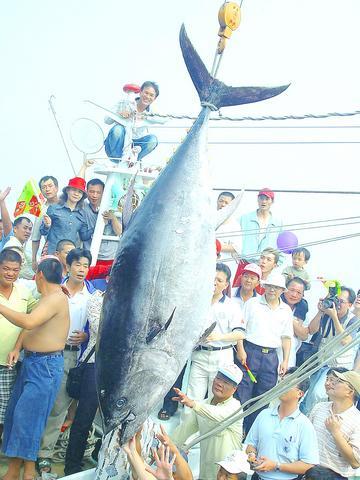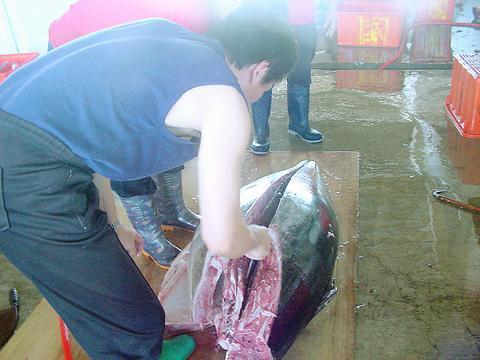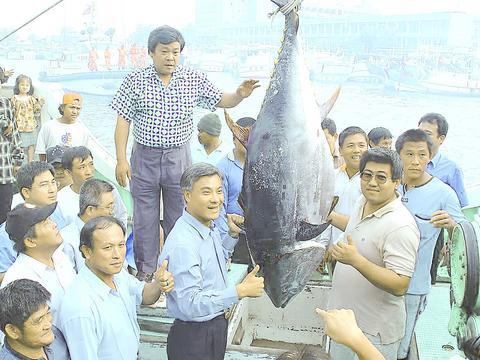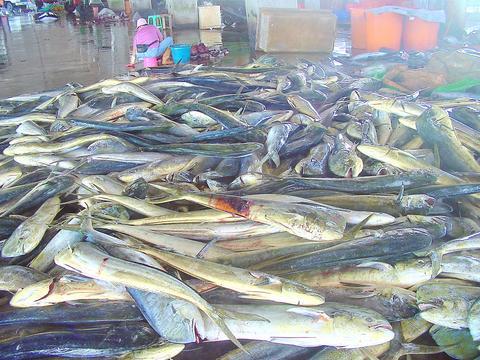Forget SARS. It's tuna season in Tungkang (
Far away from fears of severe acute respiratory syndrome, this southernmost county is holding the "Pingtung Bluefin Tuna Cultural Festival 2003" -- starting yesterday through to June 29 -- in the hope of enticing gourmands and tourists to sample the magnificent fish, which can grow up to 4m in length and weigh up to 500kg.

PHOTO COURTESY PINGTUNG COUNTY GOVERNMENT
In terms of bluefin tuna catching, Taiwan leads the world and this is largely due to use of the latest technologies to catch the fish, said Chang Cheng-ping (

PHOTO: DEREK LEE, TAIPEI TIMES
Around 50,000 people live in Tungkang, comprising Taiwanese, Hakka and Chinese. And, although the population has decreased recently, it is still one of the most important fishing harbors in the country and the epitome of a thriving fishing port. The local fishermen's association is preparing to celebrate its centennial anniversary next month and the restaurant business, in particular, is booming, thanks largely to the conscientious efforts made by the county government since 2001 to promote this annual cultural event.
Tungkang residents say there are plenty of reasons to visit their town, but they are particularly proud of what they call their "three treasures": Namely, the fine-textured bluefin tuna, the tiny and mouth-watering sergesgid shrimp (

PHOTO: DEREK LEE, TAIPEI TIMES
Chang Tai-fang (

PHOTO: DEREK LEE, TAIPEI TIMES
Tuna is extremely healthy and rich in essential fish oils such as DHA (docosahexaenoic acid), which is particularly abundant in brain and retina tissue and is good for cardiovascular health, brain and nervous system function. Even better, though, the fine taste of its rose-pink flesh melts away in your mouth, an impressive sensation which has easily won over numerous Taiwanese and Japanese gourmets over the years.
"I would not miss the taste of it for anything in the world. It is just hard to imagine the feeling of a piece of fish meat melting in your mouth like that ... it's a great feeling, almost funny," Chai Cheng-hsian (
Dubbed by locals the "Black Jug" (
Lin Han-chou (林漢丑), the director of Tungkang fish market and a fisherman of nearly 30 years, said the North Pacific bluefin tuna is found from Green Island all the way up north to Ilan County (宜蘭縣), though bluefin tuna family members can also be found in the seas around Sicily, Italy. Tuna swim in the strong, warm currents of the North Pacific Ocean, or Kuroshio (黑潮), which emerge from around the equator near the Philippines and push northward a variety of fish in different seasons, past the Ryukyu and Kyushu Islands, and into the Japan Sea.
A study published by the Taiwan Fisheries Administration (
This journey takes advantage of the stocks of flying fish, which abound in the sea near Green Island and Orchid Island. It is at this time that bluefin tuna rise from the depths of the ocean and fisherman are able to make an easier catch.
Commenting on this year's tuna catch so far, Lin said that as of May 9, fishermen at Tungkang had caught 695 bluefin tuna, which is far below last year's level of 1,500 in the same period. The reasons for this shortfall, Lin said, are twofold.
First, the lingering typhoon Kujira in late April has resulted in fishing boats idling in port for over a week. Secondly, the Philippines navy detained five fishing boats from Tungkang last year and now no-one is willing to fish the overlapping fishing territory between Taiwan and the Philippines in the Bashi Channel (
Even so, the northward migration of schools of tuna is keeping the fishermen of Tungkang busy. The first bluefin tuna of the year was caught on April 23 and was a 117kg fish which was sold for NT$585,000 (about NT$5,000 per kilogram). Two days later, a 311kg tuna was hooked and sold for NT$2,052,600 (about NT$6,600 per kilogram). The local record for a bluefin tuna is over 450kg with a body length of 3m and was set four years ago. The world record is 500kg and 4m in length.
Sale prices have gone up for the fish and last year 1kg of tuna meat was sold for NT$7,000 at the wholesale fish market at Tungkang, a record until yesterday when President Chen sponsored the opening ceremony and "auctioned" 1kg of fish for over NT$20,000.
The fishermen at Tungkang mostly operate 20-tonne boats set up specifically to catch bluefin tuna, with eight crew. There are up to 550 boats rushing in and out of the harbor each day, on their way to the fishing grounds which are a two- to three-day trip away. To keep the catch fresh, a
fishing boat usually heads back as soon as it catches five fish.
"You know, for each 20-tonnes boat, it costs more than NT$10 million to build. The expense runs up to NT$150,000 for every trip to sea. So, if fishermen can catch five tuna every time, they can basically cover all of their expenses, plus a fair profit. That is why they are so anxious to move out again once the cargo is unloaded at this time of the year," Lin said.
There are, however, hard times in the industry at the moment and Lin estimates the total catch of bluefin tuna this year will be approximately 3,500 fish when the season ends in late June, falling far short of last year's level of 5,300.
Even so, Tungkang's fishermen will set out for years to come in the hope of another monster catch from the deep, as their ancestors did before them.

On April 26, The Lancet published a letter from two doctors at Taichung-based China Medical University Hospital (CMUH) warning that “Taiwan’s Health Care System is on the Brink of Collapse.” The authors said that “Years of policy inaction and mismanagement of resources have led to the National Health Insurance system operating under unsustainable conditions.” The pushback was immediate. Errors in the paper were quickly identified and publicized, to discredit the authors (the hospital apologized). CNA reported that CMUH said the letter described Taiwan in 2021 as having 62 nurses per 10,000 people, when the correct number was 78 nurses per 10,000

As we live longer, our risk of cognitive impairment is increasing. How can we delay the onset of symptoms? Do we have to give up every indulgence or can small changes make a difference? We asked neurologists for tips on how to keep our brains healthy for life. TAKE CARE OF YOUR HEALTH “All of the sensible things that apply to bodily health apply to brain health,” says Suzanne O’Sullivan, a consultant in neurology at the National Hospital for Neurology and Neurosurgery in London, and the author of The Age of Diagnosis. “When you’re 20, you can get away with absolute

May 5 to May 11 What started out as friction between Taiwanese students at Taichung First High School and a Japanese head cook escalated dramatically over the first two weeks of May 1927. It began on April 30 when the cook’s wife knew that lotus starch used in that night’s dinner had rat feces in it, but failed to inform staff until the meal was already prepared. The students believed that her silence was intentional, and filed a complaint. The school’s Japanese administrators sided with the cook’s family, dismissing the students as troublemakers and clamping down on their freedoms — with

As Donald Trump’s executive order in March led to the shuttering of Voice of America (VOA) — the global broadcaster whose roots date back to the fight against Nazi propaganda — he quickly attracted support from figures not used to aligning themselves with any US administration. Trump had ordered the US Agency for Global Media, the federal agency that funds VOA and other groups promoting independent journalism overseas, to be “eliminated to the maximum extent consistent with applicable law.” The decision suddenly halted programming in 49 languages to more than 425 million people. In Moscow, Margarita Simonyan, the hardline editor-in-chief of the